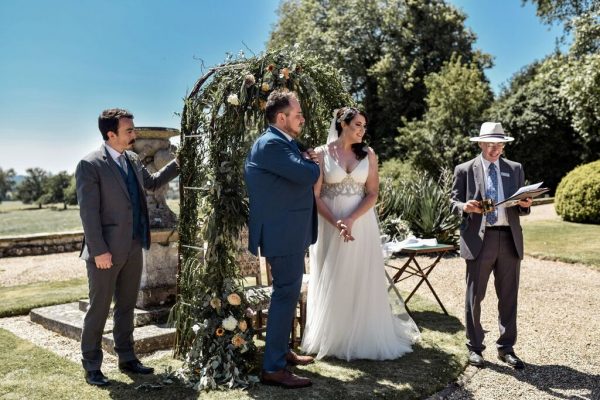
by Michael | Jan 31, 2022 | Blog
Wedding planning is a very delicate balancing act. First and foremost, bride and groom must see eye-to-eye. Secondly, if other people are involved, their feelings and opinions may not correspond to the couple’s. Thirdly, social distancing and all that goes with it are nowadays part of the mix.
Bride and Groom
In many cases, the bride and bride’s family will be the prime movers in the planning. The groom usually likes the plans run past him, but often doesn’t want deeper involvement.
However, the bride shouldn’t go against his wishes – or behind his back – and risk an altercation on – or after – the wedding day!
Actually, don’t assume that no areas will interest the groom. He will probably want some sort of input into the catering and the venue. Bridesmaids’ dresses may possibly interest him less.
So the bride should try and keep him in the picture. The couple should discuss any issues – amicably! They both need to agree on the venue and officiant.
So let the groom participate in the planning, if he wants to. Accept that not every groom will be enthused, though. Give-and-take may be the order of the day(s).
Wedding Party
Of course, others may be playing a part. If we have a team, do we include bridesmaid, flower-girl, usher, Best Man, parent, and so on, in the planning? If so, how much notice should be paid to their views?
The bottom line is that the wedding is the couple’s affair, so whatever they want ought to count. Even if someone else is bankrolling the affair, it is still the couple’s big day.
However, if they are expecting others to contribute (whether financially or as an active participant), there may be a need for some compromise. Consultation is important. Nobody should be forced to go against their wishes or take on a role they’re really unwilling to adopt.
The middle course may be the order of the day. Possibly, somebody who might otherwise be overlooked could be invited to read a poem. Perhaps a moody youngster can be put in charge of the wedding presents. A bridesmaid, reluctant to wear a certain dress, can be given a bunch of flowers in recompense.
Most families are willing – and able – to reach a balance, and a wonderful day can be had by all.
If you have any thoughts or questions arising from this, feel free to contact me.

by Michael | Jun 15, 2021 | Blog
As last week’s blog (about outstanding ceremonies) seemingly aroused some curiosity, I thought I’d continue the thread. This time it’s about things that didn’t quite go to plan …
This example takes some beating, I think.
Maybe not the right sort of Conduct
I am aware how busy the month before the wedding is likely to be for the couple. So, I always aim to work with them well ahead of time. Then we can sort out a perfect order of service a good few weeks before the actual ceremony without pressure. That leaves them free to concentrate on other needs.
We may not speak again until the big day, except that I give them a call the week of the wedding, mostly for mutual reassurance.
On this occasion, I rang the bride four days prior to the ceremony. I asked if she was excited, and she said “no”. I was rather taken aback. She asked whether Dennis hadn’t told me? (Dennis – not real name – was the groom.) No, he hadn’t made any contact.
Well, it turns out that the wedding was off, as Dennis had been caught in flagrante!
I couldn’t believe that he was preparing to make his marriage vows in a few days’ time while already unfaithful!
Not even as a joke …
I arrived early – as always – for one of my weddings. It was at the Royal Box, Epsom (no royalty could make it, unfortunately!). It wasn’t long before the groom arrived, extremely nervous. As I normally do, I made small talk with him to try and make him more relaxed.
“I can see you’re nervous – I’ll bet you’ve forgotten the rings,” I said insouciantly.
He turned pale.
“You’re right. I left them in the hotel.”
He managed to fetch them and return before the (tardy) bride arrived; all was well in the end.
Communication Breakdown
One summer wedding in Brixton turned awkward when the bride was late – very late – for her wedding. After 20-30 minutes, the best man tried to contact her, but there was no phone reception. When some wag suggested that the bride might not be going to appear, the groom started having kittens. I offered to get him a glass of water, and he agreed.
I left my spot and went across the hall to the kitchen. Having poured out some water, I found my entry barred because the bride had suddenly arrived and was processing in! How was I to get to the front without detracting from the bride’s entrance?
Luckily, I managed to sneak round the side and arrived at my post just before the rather surprised bride!
It turns out that the driver had got lost and, as we realised, there was no Wifi in the venue!
The vast majority of my ceremonies are well-prepared and go smoothly. If something does go wrong, it’s usually sorted or forgotten quickly enough.
Have a chat with me to see how we can get you hitched without a hitch!

by Michael | Feb 1, 2021 | Blog
Wedding planning is a very delicate balancing act. First and foremost, bride and groom must see eye-to-eye. Secondly, other people may well be involved, and their feelings and opinions may not correspond to the couple’s. Thirdly, there is social distancing and all that goes with it to bargain for.
Bride and Groom
In many cases, the bride and bride’s family will be the prime movers in the planning. The groom usually likes the plans run past him, but often doesn’t want deeper involvement.
However, the bride shouldn’t go against his wishes – or behind his back – and risk an altercation on – or after – the wedding day!
Actually, don’t assume that no areas will interest the groom. He will probably want some sort of input into the catering and the venue. Bridesmaids’ dresses may possibly interest him less.
So the bride should try and keep him in the picture. The couple should discuss any issues – amicably! They both need to agree on the venue and officiant.
So let the groom participate in the planning, if he likes. Accept that it may not enthuse him that much, though. Give-and-take may be the order of the day(s).
Wedding Party
Of course, others may be playing a part. Do we include bridesmaid, flower-girl, usher, Best Man, parent, and so on, in the planning? How much notice should be paid to their views?
The bottom line is that the wedding is the couple’s affair, so whatever they want ought to count. Even if someone else is bankrolling the affair, it is still the couple’s big day.
However, if they are expecting others to contribute (whether financially or as an active participant), there may need to be some compromise. Consultation is important. Nobody should be forced to go against their wishes or take on a role they’re really unwilling to adopt.
The middle course may be the order of the day. Possibly, somebody who might otherwise be overlooked could be invited to read a poem, say. Perhaps a moody youngster can be put in charge of the wedding presents. A bridesmaid, reluctant to wear a certain dress, can be given a bunch of flowers in recompense.
Social Distancing
You don’t need me to point out that it is currently well-nigh impossible to plan for a big, or even, moderate-sized, wedding. If you don’t know how many guests you will be allowed to invite, how can you book the venue, catering, entertainment etc.?
So it may be an idea to marry legally (ie small register office ceremony) as soon as you wish. Then celebrate the ceremony (officiated by your civil celebrant of choice) and reception you really wanted a year down the line (on your first anniversary, say).
Eventually …
Whenever you are able to marry as you want, remember that it is likely to be a team effort.
Most families are willing – and able – to reach a balance, and a wonderful day is had by all.
If you have any thoughts or questions arising from this, feel free to contact me.

by Michael | Oct 27, 2020 | Blog
I hesitate every time I sit down to pen a blog about weddings these days. Will it be relevant to you, my reader? And what COVID-19 regulation is going to spring up and invalidate my comment?
To be fair, even before March, things had been evolving in the wedding world. The bride wearing white was no longer a given. Some chose to marry at the seashore. Many were writing their own vows.
So I’m not going to be prescriptive, but I’d like to define the roles that could be played at weddings post-2020. And I’m making no assumptions about social distancing.
Bride and Groom
There’s a little positive stuff for the couple to do apart from just turning up and “tying the knot”.
The bride will not normally be around when the guests arrive, so it should be down to the groom to welcome them. Otherwise, he will wait with the celebrant for his bride to sweep in.
He may have a few things to say during the ceremony, but his main role, apart from that, will be to give a speech at the reception – if there is one at all.
The bride will be the star of the show, of course. She should relish the attention!
Depending on arrangements (and social distancing), the couple should try and speak to every guest at some point during the event. At the least, they should thank their guests for attending.
These days, the bride may deliver a speech too (another example of the evolution I spoke of).
The couple may well have at least the first dance together.
Bride’s Father
The bride’s father’s role (apart from a financial one, possibly!) may well be to welcome the guests at the start of the reception.
He should keep it short, say how happy he is this day and thank the guests for coming.
Best Man
Nowadays (further evolution!) you can come across “Best Women”, but I hope I will be forgiven, if I refer only to “Best Man” for simplicity’s sake.
The Best Man may play a minor role – the minimum of his tasks is normally to liaise between the groom and the venue or suppliers. He may also have to do something on spec, like fetching a glass of water for the groom. He should generally look after the groom and help him control his nerves.
Additionally, he may serve as a toastmaster (“please assemble for the photographs now” etc.).
The Best Man’s main public role is normally giving the speech at the reception. Though groom-centred, it should not omit mention of the bride, if at all possible. If all the talk is about the groom, there is a risk of excluding about half the guests after a while.
The Best Man should aim at about 10 minutes, and, although humour is more than welcome, malicious, crude or controversial comments are not.
Other roles
I am not going to do more than mention flower-girls, bridesmaids or ushers. They will probably not be able to play a part in most weddings for the foreseeable future (or even longer).
So there it is.
Roles may matter to you, depending on how traditional you want your ceremony to be, but, if you are having them, then it’s good to honour friends and/or relatives by sharing them out judiciously.
Do make sure they understand your expectations, though!
Don’t forget that you can always have a chat with your celebrant, if you’re not sure how to go about things.

by Michael | Nov 19, 2019 | Blog
Wedding planning
is a very delicate balancing act. First and foremost, bride and groom must see
eye-to-eye. Secondly, other people may well be involved, and their feelings and
opinions may not correspond to the couple’s.
Bride and Groom
Usually – and I know this is a terrible stereotype! – the groom doesn’t pay much attention to the organisational details of the wedding. I know some do play their part wonderfully. However, the majority, in my experience, would like no more than some kind of idea what the bride is planning. Just to rubber-stamp it.
Even in these circumstances, bride and groom need to co-operate to some extent. The groom may not be bothered about the menu (although that’s something he might well take an interest in), but may care passionately about the guest list. They need to discuss this (amicably). They should both agree on the venue and officiant.
So my best advice here is to play an open game. By that I mean that the groom should be able to participate in the planning, if he likes. The bride should offer to let him know what she is planning (but spare him the bridesmaids’ dresses, I’d say!).
Wedding Party
Of course,
others are involved too, whether as bridesmaid, flower-girl, usher, Best Man,
parent, and so on. How much notice should be paid to their views?
The bottom line is that the wedding is the couple’s affair, so whatever they want ought carry the day. Even if someone else is bankrolling the affair, it is still the couple’s big day.
However, if they are expecting others to contribute (whether financially or as an active participant), there may need to be some give and take. Nobody should be forced to go against their wishes or take on a role they don’t relish at all.
Compromise is the order of the day. Maybe somebody who might otherwise be overlooked could read a poem, say. Perhaps a moody youngster can be encouraged to look after the wedding presents. Possibly, a bridesmaid, sulky about the dress she is forced to wear, can be given a bunch of flowers.
Ordinarily, the families are willing – and able – to reach a balance, and a wonderful day is had by all.
If you have any thoughts or questions arising from this, feel free to contact me.




